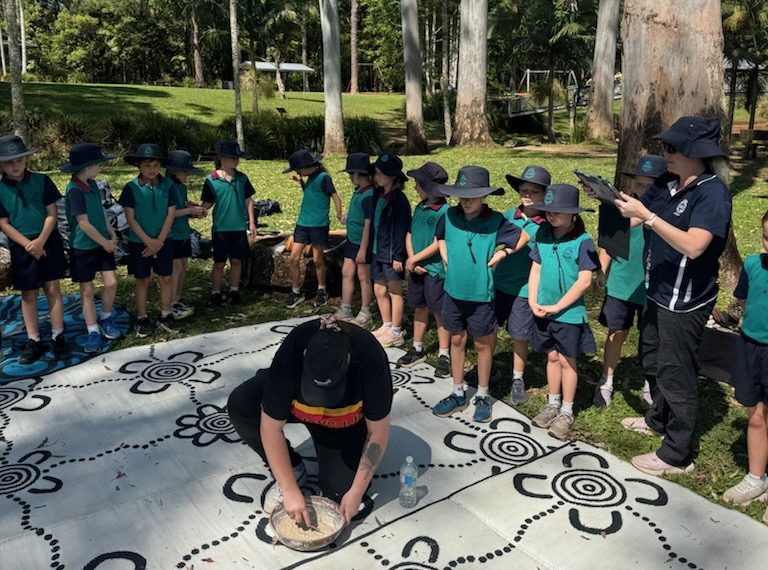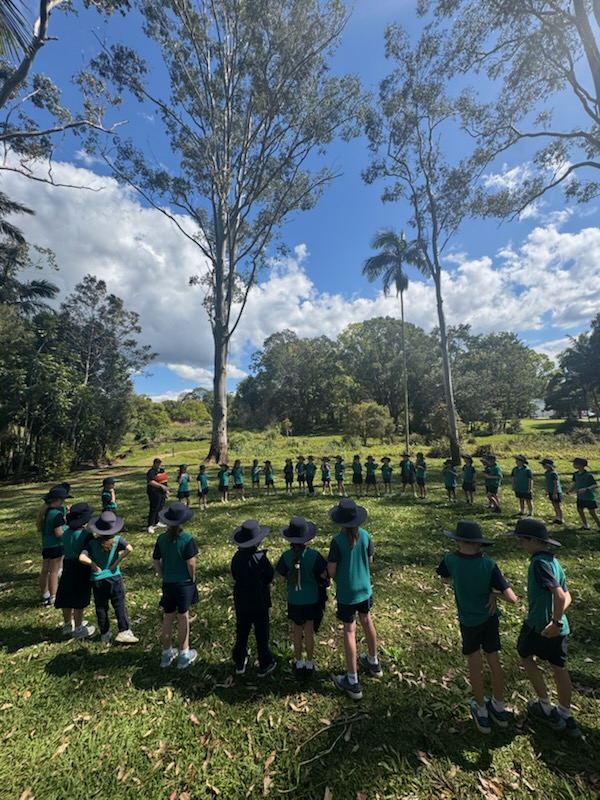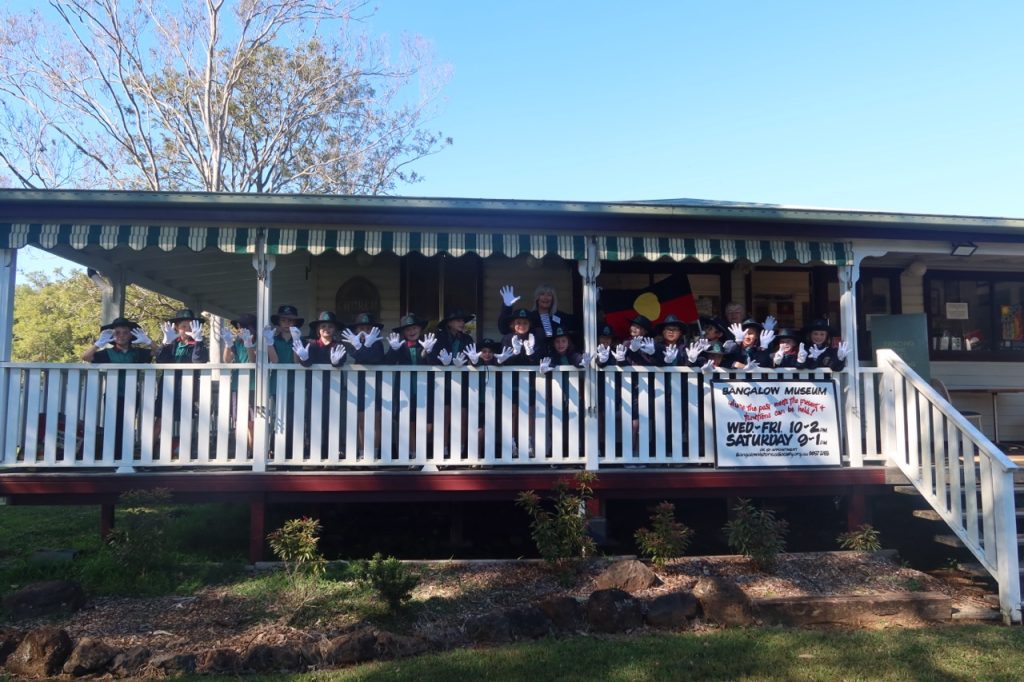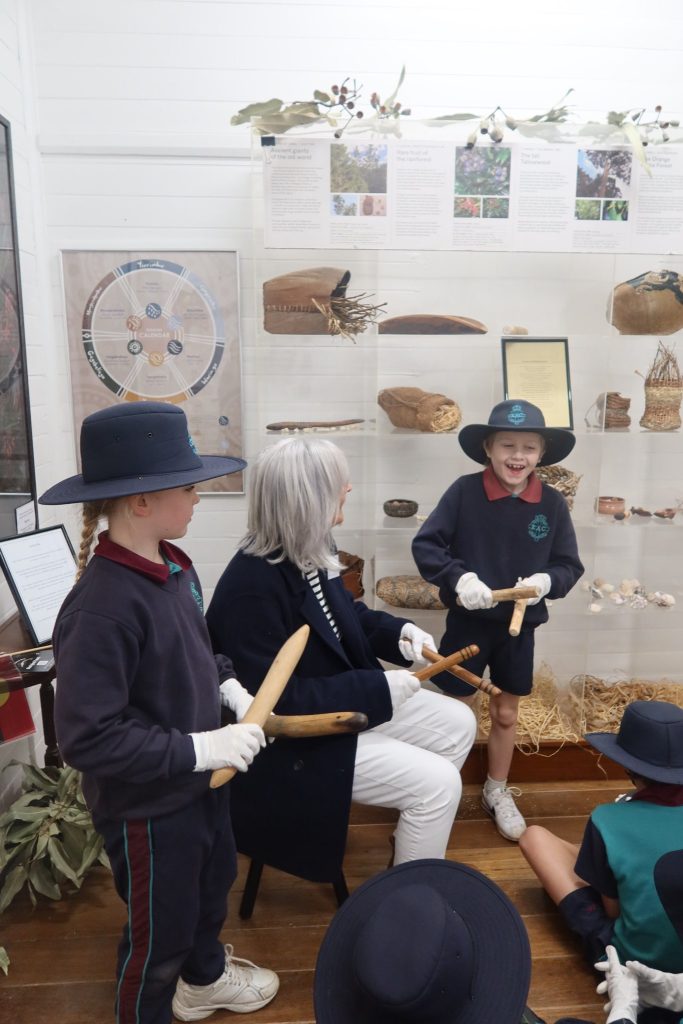
What’s behind the heightened interest of schools and teachers to expose their students to ways of absorbing knowledge other than in the classroom? Christobel Munson noticed things are changing with scores of students – primary and secondary – learning at our local museum and park.
 There’s more than one way to skin a cat, they say. In the past few months, Bangalow Heritage House Museum has started receiving requests from teachers for their students to explore the museum and neighbouring Piccabeen Park. What’s the story?
There’s more than one way to skin a cat, they say. In the past few months, Bangalow Heritage House Museum has started receiving requests from teachers for their students to explore the museum and neighbouring Piccabeen Park. What’s the story?
The Living School in Lismore wanted their teenagers to visit the museum “as part of a unit on civilisation”. A busload of 18 students – 14- and 15-year-old young learners – visited in August, keen to see how life was lived from the 1930s to 1950s. Of particular interest to them was the old classroom set-up with its ‘quaint’ wooden school desk, plus the textbooks of that era. The teenagers were also interested to find out how to get involved in their local community, and a visit to the CWA followed.
For Emmanuel Anglican College, Ballina, the incentive to bring along 45 seven- and eight-year-old kids (plus a few teachers and parents) is a program called Mini Coastal College. It forms part of an Integrated Studies course that includes science, history, geography, mathematics, English and visual arts.
Roxanne Kent, the leader of Foundational Learning at Emmanuel Anglican College, explained their interest. “Inspired by the Reggio Emilia educational approach and the Forest Schools of Scandinavia, the aim of our Mini Coastal College program is to introduce students to new, engaging, challenging and fun opportunities to learn, play and grow.
The program is delivered by highly skilled educators whose purpose is to equip and support students to investigate, explore, discover, apply, practise and master new concepts, skills and understandings, whilst also meeting the syllabus requirements in a natural outdoor environment.”
 The “natural outdoor environment” Roxanne selected was Piccabeen Park and the Bangalow Museum. Though their school is located in Ballina, teacher Alyssa Marshall explained: “Many of our students also live in and around the Bangalow area, so it is part of their community. The motive was to deepen the students’ understanding of the town’s history, culture and environment while building a stronger connection to their local community. The exploration also encouraged curiosity, respect for the environment and a sense of responsibility in caring for the area, helping students appreciate both the past and the importance of protecting Bangalow’s future.”
The “natural outdoor environment” Roxanne selected was Piccabeen Park and the Bangalow Museum. Though their school is located in Ballina, teacher Alyssa Marshall explained: “Many of our students also live in and around the Bangalow area, so it is part of their community. The motive was to deepen the students’ understanding of the town’s history, culture and environment while building a stronger connection to their local community. The exploration also encouraged curiosity, respect for the environment and a sense of responsibility in caring for the area, helping students appreciate both the past and the importance of protecting Bangalow’s future.”
But what did the kids themselves think about the experience? Leo said, “I love Coastal College because we get to go out into nature and experience lots of things.” For Max, it was “because you get to be out of school and in the sunshine.” For Rachael, “The thing I love most about Coastal College is that we got to learn about the park’s heritage and explore nature.” From the teachers’ perspective, “It was a valuable learning experience for all students. Outdoor learning allows children to explore, discover, and learn in hands-on ways,” added Mel McClelland.
 Though the Emmanuel College students who visited were from Year 2 in a Coastal College program that runs over eight Thursdays during Term 3, their Year 3 students go to Seven Mile Beach and Lake Ainsworth in Ballina, while Year 4 students visit Ballina’s Lighthouse Beach. The program will happen again every year.
Though the Emmanuel College students who visited were from Year 2 in a Coastal College program that runs over eight Thursdays during Term 3, their Year 3 students go to Seven Mile Beach and Lake Ainsworth in Ballina, while Year 4 students visit Ballina’s Lighthouse Beach. The program will happen again every year.
And what was the experience like for the Bangalow Historical Society? “When the students visited Heritage House, they discovered a wealth of new things which piqued their curiosity – so important for learning,” commented Historical Society Secretary and former teacher, Heather West. “Coming here also exposed them to a diversity of ideas and information about different people, places and time periods, all contributing to broadening their horizons of knowledge. Handling Aboriginal artefacts and understanding their use helped contribute to their appreciation and respect of our Indigenous culture.
“There’s no doubt about it, their visit was a win all round. Our volunteers loved it, the teachers enjoyed observing their students being engaged and communicating with others, and the kids left with a head full of new knowledge and an understanding about our collective past. There are huge benefits for kids of all ages getting out of the classroom and into an informal learning environment where they’re invited to explore and understand new concepts. The museum displays helped develop critical thinking skills and gave the kids an understanding of the past and how it compares with the present.”
To enquire about a school learning experience, call 02 6687 2183